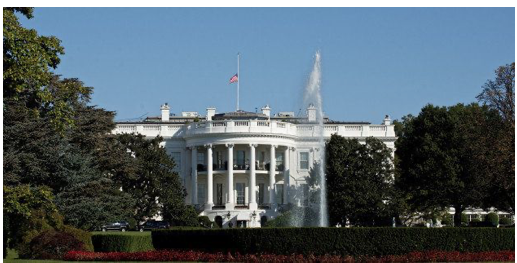CommentsVIEW FROM HERE--Inspired by predictive variables in earthquake research, political historian Allan Lichtman's 1996 book, The Keys to the White House, introduced his prediction system for determining the outcome of U.S. presidential elections.
Lichtman's formula has received a fair amount of attention since its publication because it actually works. Even before the book came out, friends and colleagues have verified that he has successfully predicted the last eight results since 1984, including Trump's Electoral College victory in 2016 (quite early on it should be noted).
Basically the theory demonstrates that polls and pundits do not matter. If the nation is doing well during the term of the incumbent party, that party is positioned to take office for an additional four years. The theory is based on 13 different factors, and according to Lichtman, if more than 6 are answered in the negative, it is all but guaranteed that the party in control will lose. The 13 factors with a brief description are as follows:
- Party Mandate: After the midterm elections, the incumbent party holds more seats in the U.S. House of Representatives than after the previous midterm elections.
- Contest: There is no serious contest for the incumbent party nomination.
- Incumbency: The incumbent party candidate is the sitting president.
- Third party: There is no significant third party or independent campaign.
- Short-term economy: The economy is not in recession during the election campaign.
- Long-term economy: Real per capita economic growth during the term equals or exceeds mean growth during the previous two terms.
- Policy change: The incumbent administration effects major changes in national policy.
- Social unrest: There is no sustained social unrest during the term.
- Scandal: The incumbent administration is untainted by major scandal.
- Foreign/military failure: The incumbent administration suffers no major failure in foreign or military affairs.
- Foreign/military success: The incumbent administration achieves a major success in foreign or military affairs.
- Incumbent charisma: The incumbent party candidate is charismatic or a national hero.
- Challenger charisma: The challenging party candidate is not charismatic or a national hero.
Based on Lichtman's formula, if the election were held tomorrow, Donald Trump would be reelected easily. Let's examine each of the factors to see why.
Party Mandate: Although this factor counts as a major negative for Trump, losing control of the House has not been detrimental. At most it has presented a burdensome headache.
Contest: There is absolutely no contest whatsoever for the incumbent party nomination. The GOP is the Party of Trump. Bill Weld and Joe Walsh are not serious contenders.
Third Party: There is no significant third party or independent campaign. Michael Bloomberg's decision to run as a Democratic erased that scenario.
Short-term economy: The economy is doing quite well by most standards. As of the latest survey, the unemployment rate ticked down to 3.5% from 3.6%, back to the 2019 low and matching the lowest jobless rate since 1969.
Long-term economy: Tough to say at this juncture. What can be said is that Americans feel confident about the state of the economy. According to survey company Gallop, U.S. economic confidence in January reached 41%, the highest level since October 2000.
Social unrest: Compared to the massive anti-war protests of the Bush years and the Occupy/ Tea Party revolts of the Obama era, Trump has not encountered anything close to what Lichtman describes as social unrest. Yes, there has been consistent opposition against Trump's policies. But this opposition has not turned widespread, violent, or politically hazardous to the GOP.
Scandal: This factor should have presented a major problem for Trump during the Stormy Daniels affair, Muslim travel ban, border crisis, government shutdown, Mueller Report, and Ukraine. Remarkably, he has managed to squirm his way out of each of these relatively unharmed. Frankly speaking, Trump has even found a way to use these "setbacks" to his unique advantage. For example, the primary goal House Democrats had in the impeachment trial was to demonstrate to the American people that Trump was embroiled in a massive cover up and political scandal. They failed. True to form, the president is now fundraising mightily off his acquittal.
Foreign Military Failure: None to speak of. Opponents have tried to paint the assassination of Iran general Qasem Soleimani as a military blunder, but that is not how his base sees it. Although reports suggest that he was ambivalent about the order, Trump has effectively championed this decision as a significant turning point in the War on Terrorism.
Foreign Military Success: From the perspective of Trump supporters, there have been several military successes, including the killing of ISIS leader Abū Bakr al-Baghdadi and the final dismantling of the Caliphate.
Incumbent Charisma: Dems may disagree wholeheartedly, but Trump has elevated his brand to this position of political strength through the sheer force of his personality. He is, to millions of Americans and people all over the world, a historic figure that has revolutionized politics as we know it. Compared to his challengers on the other side of the aisle, Trump is, I am sad to admit, the most charismatic person in the race.
Challenger Charisma: See above. Bernie Sanders has an amplified and devoted following, especially among youth voters. This popularity, however, is due to his policies and not his personality.
All in all, this does not bode well for the Dems. If Lichtman's formula is any predictor of 2020-and as I stated before, he has been right for the last eight elections-Donald Trump appears primed for reelection.
George Cassidy Payne is a social worker and adjunct instructor of philosophy. He has degrees in history from St. John Fisher College, Colgate Rochester Crozer Divinity School, and Emory University.)
-CW
















